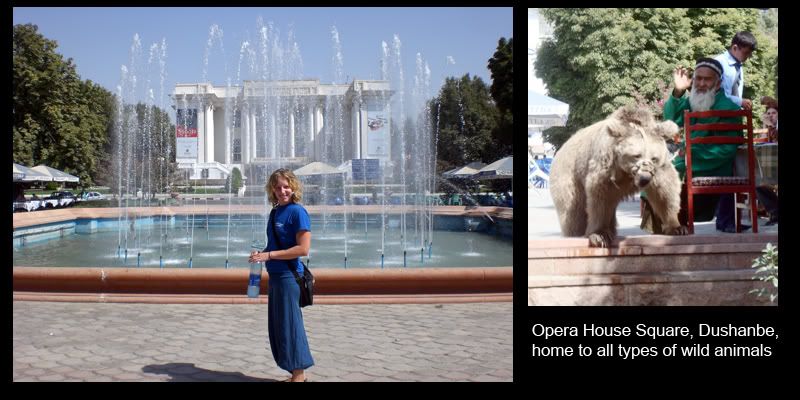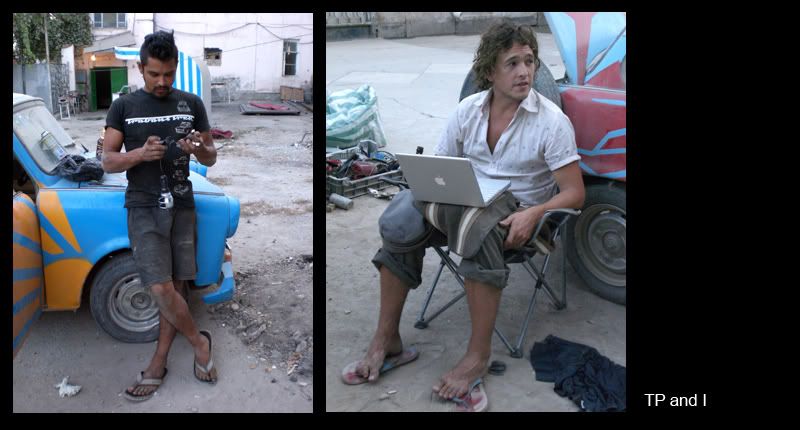Dushanbe, Tajikistan
17th September, 2007
by Dan Murdoch
HERE in Dushanbe, chewing gum is money. Through some quirk of deflation, there are few low denomination coins in circulation. So you receive Wrigley’s Orbit in lieu of change at most shops- in the supermarket the cashier had a tray full of it. I was disappointed to learn the currency can only be exchanged one way- they refused to let me use a packet of faded Juicy Fruit to pay for a beer.
To 19th Century Russians, this mountainous region of Khanates and tribes was a piece in the Great Game- another step towards India. In the 1930s the Soviets kindly created a full republic here, inventing Tajikistan, but for the next 60 years propped the new nation up and used it as a staging post for their war in Afghanistan.
This rugged land was the Central Asian country worst affected by the collapse of the Soviet Union: high unemployment and infant mortality, a reliance on imported food, no real exports.
Within a few years civil war raged- Islamist rebels against the pro-government forces from the northern city of Khojend, Tajikistan’s richest city and long the power base of the ruling elite.
It ended in 1997, with compromise and the promise of political representation for the rebels. Since then the UN and the Agha Khan Foundation have supported the isolated mountain towns, which are slowly becoming more self sufficient.

Dushanbe, the capital, is the most Westernised city we have visited since Baku.
Bowling, discotheques and, strangely, an Ecuadorian restaurant.
A fountain filled square opposite the opera house serves as the centrepiece of the city. During the warm evenings it fills up with locals sitting out to relax with a beer. A strange looking mix of Persian and Russian, I saw two fearsome old babushkas wrapped in layers of scarves and throws knocking back Russian lager together, while nearby a dark, thin-featured man with a beard drank dark tea and smoked incessantly.
One afternoon a ‘Dancing Bear’ was in the square. I'm not into animal rights, but it was a pretty disturbing sight. The bear wasn’t dancing so much as rocking in the way you expect of mental patients in straight jackets- side to side its nuzzled snout swang, while it beat its paws in a twisted rhythm. It’s owner, a tall bony man wrapped in traditional robes, would prod the bear with a stick to manoeuvre it. I tried to take a surreptitious photo, but the owner was wily. He saw and started shouting for money as I turned and pretended not to hear.
Later that day I again crossed the square, and, on its owners command, the huge bear reared up on its hind legs and ran at me. I was sure the old man was getting his own back. I discovered that being charged by a seven foot mountain bear is one of life’s scarier experiences, but I did the best I could: let out a high pitch scream and ran.
We based ourselves near a Southern Fried Chicken and began preparing for the Pamir Highway.
“No. It is not possible for you to get across so quickly. I think five days in a good car. In yours….” The tour guide tailed off. “Last month we had a group of Italians stuck in the mountains for a week when they broke down. They had to get a part shipped from Europe. But they had all the right equipment, satellite phone… Do you have a satellite phone?”
We had two battered Nokias, one with a faulty battery.
“No.”
The guide shrugged as if the argument was won. We were sitting in his two-room office, the walls pinned with maps of the mountains. He looked European, spoke with an almost German accent and claimed to know the Pamirs as well as anyone.
We asked about our alternative route- a quick, straight path through the centre of the country, which seemed the most direct way into Kyrgyzstan.
He laughed: “No, no, you don’t go over there, that’s rebel territory- the area is full of the rebels who lost the war. You would be safe, but they would take dollars off you all the time. They will dress up in police uniforms and demand money. Anyway the border is closed to foreigners.”
He frowned and flattened out some papers on his desk.
“I don’t think you have planned your stay in Tajikistan very well.”
Carlos and I looked at each other. We hadn’t really planned it at all.
“If you do not do the Pamirs then you must go north, there is a route out of the country. It will take three days. You will have to go back over the Anzob Pass. But the borders between Uzbekistan, Tajikistan and Kyrgyzstan are disputed. The Uzbeks have claimed strips of land, some of them only a few kilometres across. But you still need a visa to pass these areas. So maybe you need a new Uzbek visa- or maybe you can drive around the Uzbek land, I don’t know.
“I can offer no guarantees about this route. But with your schedule, the Pamirs are not possible.”
We headed back with the options heavy on our minds. Heading north would take three days, but would mean missing one of the highlights of the trip, and tackling Anzob again- not something we fancied.
But taking on the Pamirs would probably take six days if all went well. Far longer if we had issues.
Because of our visas we had 13 days to get to Russia. We needed to get out of Tajikistan, cross Kyrgyzstan, which has the worst roads in the region, then bomb through the flat Kazak steppe. Maybe 2,500 miles of mostly bad roads, many through the mountains, in 13 days. In a normal car, no problem- but it took us two months to get 10,000km by Trabant.
Overstaying our Kazak visa would certainly have financial consequences- but it would also give us even less time to cross Russia- an already challenging 1,000km of unknown, rarely used Siberian roads, in a week.
Carlos and I reluctantly agreed that we couldn’t attempt the Pamirs- with our schedule it was just about possible to cross them, but everything would have to run like clockwork. And to date things had hardly run like clockwork. Maybe more like a maladjusted sundial.
We put the decision making process to the rest of the group, who were disappointed but understood our argument.
“The question is,” summised OJ, “Do we want to do the Pamir Highway, or do we want to get to Cambodia? I want to get to Cambodia.”
And we all agreed.
Later that evening the weariness I had been carrying in my bones for the past few days turned into a fever, so I threw on all the clothes in my backpack and wrapped myself up in bed to sweat it out.

I was woken by Lovejoy.
He was excitable.
“We can do the Pamirs. I’ve been speaking with these Swiss people, they’ve just come off the mountains- they said it was easy. It’s only two days to Khorog, and then two more to the border. It’ll take four days.”
I felt terrible, delirious, sweaty, aching, shivering.
“What car were they driving?”
“They were in a big 4x4.”
“Right.”
“But they said the roads were fine.”
I was exhausted and in no mood to argue.
“Dude,” if offered in resignation, “I really want to do the Pamirs. If it’s possible then I'm up for it,” I said not realising the consequences of the words.
I had cast my vote.
The next day I lay in bed feeling bad while the rest of the group sorted out passes for the Highway and worked on the cars.
We were ready to go by seven. But Lovey still needed to work on some footage with Brady, who was flying home that night. So, in typical Trabant Trek fashion, we didn’t even leave till midnight. We had eleven days to get to Russia.
Ends
mrdanmurdoch@gmail.com


3 comments:
I love ur blog man, its amazing!
Brilliant writing. Keep it up!
In India I also came across a shop keepers who gave change in confectionery. However I never tried to buy things with them but I doubt I would have had any more luck.
Jassi
Post a Comment